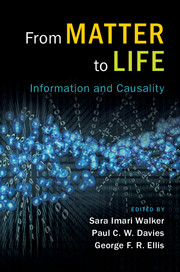Book contents
- Frontmatter
- Contents
- About the authors
- 1 Introduction
- Part I Physics and Life
- Part II Bio from Bit
- Part III Life's Hidden Information
- Part IV Complexity and Causality
- 12 Life's Information Hierarchy
- 13 Living through Downward Causation: From Molecules to Ecosystems
- 14 Automata and Animats: From Dynamics to Cause–Effect Structures
- 15 Biological Information, Causality, and Specificity: An Intimate Relationship
- Part V From Matter to Mind
- Index
15 - Biological Information, Causality, and Specificity: An Intimate Relationship
from Part IV - Complexity and Causality
Published online by Cambridge University Press: 02 March 2017
- Frontmatter
- Contents
- About the authors
- 1 Introduction
- Part I Physics and Life
- Part II Bio from Bit
- Part III Life's Hidden Information
- Part IV Complexity and Causality
- 12 Life's Information Hierarchy
- 13 Living through Downward Causation: From Molecules to Ecosystems
- 14 Automata and Animats: From Dynamics to Cause–Effect Structures
- 15 Biological Information, Causality, and Specificity: An Intimate Relationship
- Part V From Matter to Mind
- Index
Summary
The lack of a rigorous account of biological information as a proximal causal factor in biological systems is a striking gap in the scientific worldview. In this chapter we outline a proposal to fill that gap by grounding the idea of biological information in a contemporary philosophical account of causation. Biological information is a certain kind of causal relationship between components of living systems. Many accounts of information in the philosophy of biology have set out to vindicate the common assumption that nucleic acids are distinctively informational molecules. Here we take a more unprejudiced approach, developing an account of biological information and then seeing how widely it applies.
In the first section, ‘Information in Biology’, we begin with the most prominent informational idea in modern biology – the coding relation between nucleic acid and protein. A deeper look at the background to Francis Crick's Central Dogma, and a comparison with the distinction in developmental biology between permissive and instructive interactions, reveals that ‘information’ is a way to talk about specificity. The idea of specificity has a long history in biology, and a closely related idea is a key part of a widely supported contemporary account of causation in philosophy that grounds causal relationships in ideas about manipulability and control. In the second section, ‘Causal Specificity: An Information-Theoretic Approach’, we describe the idea of ‘causal specificity’ and an information-theoretic measure of the degree of specificity of a cause for its effect. Biological specificity, we suggest, is simply causal specificity in biological systems. Since we have already argued that ‘information’ is a way to talk about biological specificity, we conclude that causal relationships are ‘informational’ simply when they are highly specific. The third section, ‘Arbitrariness, Information, and Regulation’, defends this identification against the claim that only causal relationships in which the relation between cause and effect is ‘arbitrary’ should count as informational. Arbitrariness has an important role, however, in understanding the regulation of gene expression via gene regulatory networks. Having defended our identification of information with specificity, we show in the final section, ‘Distributed Specificity’, that information is more widely distributed in biological systems than is often supposed. Coding sequences of DNA are only one source of biological specificity, and hence only one locus of biological information.
- Type
- Chapter
- Information
- From Matter to LifeInformation and Causality, pp. 366 - 390Publisher: Cambridge University PressPrint publication year: 2017
- 5
- Cited by



